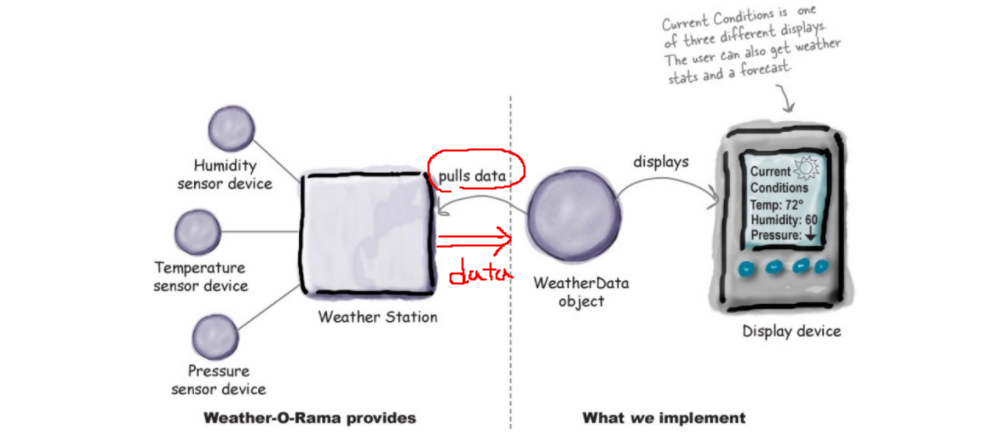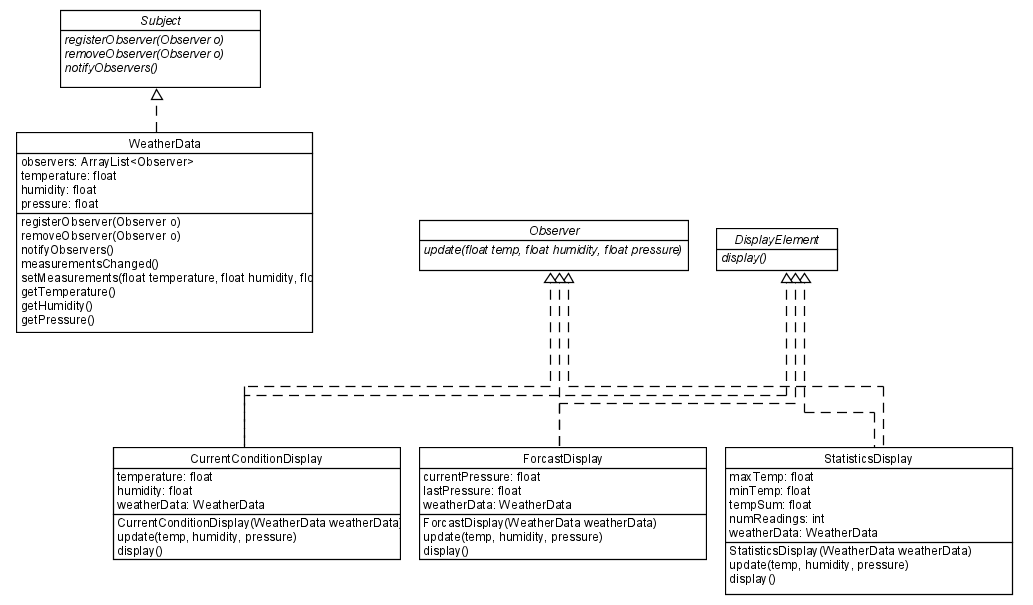[디자인패턴 수업 7주차 2차시] Observer pattern
source: "Head First Design Patterns" / Eric Freeman

- Pattern name: observer pattern
- Intention: a one-to-many dependency between objects so that when one object changes state, all its dependents are notified and updated automatically
- Motivation: You need to notify a varying list of objects that an event has occured
=> 옵저버들은 이벤트 발생을 모니터링할 책임에 대해 완화된다.
High cohesion & Loosely coupled- 옵저버 패턴은 'Loosely coupled'를 향상시킨다.
- 주체(subject)가 옵저버에 대해서 알아야 할 것은 오직 옵저버의 인터페이스 뿐이다(update() 함수).
- 새로운 타입의 옵저버가 추가될 때 주체(subject)를 수정할 필요가 없다.
- 하나의 컴포넌트의 변화는 다른 컴포넌트에 영향을 미치지 않는다.
옵저버 패턴 적용 전
WeatherData 클래스(주체)
public class WeatherData {
private float temperature;
private float humidity;
private float pressure;
// 정보 갱신
public void setMeasurements(float temperature, float humidity, float pressure){
this.temperature = temperature;
this.humidity = humidity;
this.pressure = pressure;
}
// getter
public float getTemperature() {
return temperature;
}
public float getHumidity() {
return humidity;
}
public float getPressure() {
return pressure;
}
}
StaticDisplay 클래스(구독자)
public class StaticDisplay {
private float maxTemp = 0.0f;
private float minTemp = 200;
private float tempSum= 0.0f;
private int numReadings;
public void update(float temp, float humidity, float pressure) {
tempSum += temp;
numReadings++;
if (temp > maxTemp) {
maxTemp = temp;
}
if (temp < minTemp) {
minTemp = temp;
}
display();
}
public void display() {
System.out.println("Avg/Max/Min temperature = " + (tempSum / numReadings)
+ "/" + maxTemp + "/" + minTemp);
}
}WeatherStation 클래스 (메인함수) <= looks ugly and complecated..
- Subject에서 정보가 수정되면 구독자들이 이를 직접 모니터링하고 받아와야 한다.
public class WeatherStation {
public static void main(String[] args) {
WeatherData weatherData = new WeatherData();
CurrentConditionsDisplay currentConditionsDisplay = new CurrentConditionsDisplay();
ForecastDisplay forecastDisplay = new ForecastDisplay();
StaticDisplay staticDisplay = new StaticDisplay();
// 정보 갱신 1
weatherData.setMeasurements(80, 65, 30.4f);
// 구독자 객체가 직접 모니터링해야만 한다..
currentConditionsDisplay.update(weatherData.getTemperature(), weatherData.getHumidity(), weatherData.getPressure());
forecastDisplay.update(weatherData.getTemperature(), weatherData.getHumidity(), weatherData.getPressure());
staticDisplay.update(weatherData.getTemperature(), weatherData.getHumidity(), weatherData.getPressure());
// 정보 갱신 2
weatherData.setMeasurements(82, 70, 29.2f);
currentConditionsDisplay.update(weatherData.getTemperature(), weatherData.getHumidity(), weatherData.getPressure());
forecastDisplay.update(weatherData.getTemperature(), weatherData.getHumidity(), weatherData.getPressure());
staticDisplay.update(weatherData.getTemperature(), weatherData.getHumidity(), weatherData.getPressure());
// 정보 갱신 3
weatherData.setMeasurements(78, 90, 29.2f);
currentConditionsDisplay.update(weatherData.getTemperature(), weatherData.getHumidity(), weatherData.getPressure());
forecastDisplay.update(weatherData.getTemperature(), weatherData.getHumidity(), weatherData.getPressure());
staticDisplay.update(weatherData.getTemperature(), weatherData.getHumidity(), weatherData.getPressure());
}
}옵저버 패턴 적용

Main 함수
package wether;
public class WeatherStation {
public static void main(String[] args) {
WeatherData weatherData = new WeatherData();
// 각 디스플레이는 weatherData를 구독한다.
// 내부적으로 weatherData 객체가 '옵저버를 등록(registerObserver())한다.
CurrentConditionsDisplay currentDisplay = new CurrentConditionsDisplay(weatherData);
StatisticsDisplay statisticsDisplay = new StatisticsDisplay(weatherData);
ForecastDisplay forecastDisplay = new ForecastDisplay(weatherData);
// 측정 정보 갱신
// 내부적으로 weatherData 객체가 옵저버에게 새로운 정보를 알린다(notifyToObserver)
// '알린다는 것'은 옵저버의 'update()' 메서드를 호출하는 것이다.
weatherData.setMeasurements(80, 65, 30.4f);
weatherData.setMeasurements(82, 70, 29.2f);
weatherData.setMeasurements(78, 90, 29.2f);
}
}Subject 인터페이스
package wether;
public interface Subject {
// 옵저버 관리, 알림 기능
public void registerObserver(Observer o); // 옵저버 등록(구독자 등록)
public void removeObserver(Observer o); // 옵저버 제거(구독자 제거)
public void notifyObservers(); // 옵저버에게 알림(구독자에게 알림)
}Observer 인터페이스
package wether;
public interface Observer {
// 정보 갱신 기능
public void update(float temp, float humidity, float pressure);
}DisplayElement 인터페이스
package wether;
public interface DisplayElement {
// 디스플레이 기능
public void display();
}WeatherData 클래스
package wether;
import java.util.*;
public class WeatherData implements Subject {
private ArrayList<Observer> observers; // 옵저버들
private float temperature; // 제공할 온도 정보
private float humidity; // 제공할 습도 정보
private float pressure; // 제공할 기압 정보
public WeatherData() {
observers = new ArrayList<Observer>();
}
// 옵저버 등록 메서드
public void registerObserver(Observer o) {
observers.add(o);
}
// 옵저버 제거 메서드
public void removeObserver(Observer o) {
int i = observers.indexOf(o);
if (i >= 0) {
observers.remove(i);
}
}
// 옵저버 알림(구독자 알림) 메서드
public void notifyObservers() {
for (Observer observer : observers) {
// 옵저버에게 새로운 정보를 전달한다.
observer.update(temperature, humidity, pressure);
}
}
public void measurementsChanged() {
// 새로운 측정이 진행되면, 옵저버에게 알린다.
notifyObservers();
}
// 새로운 측정을 갱신한다.
public void setMeasurements(float temperature, float humidity, float pressure) {
this.temperature = temperature;
this.humidity = humidity;
this.pressure = pressure;
measurementsChanged();
}
public float getTemperature() {
return temperature;
}
public float getHumidity() {
return humidity;
}
public float getPressure() {
return pressure;
}
}여러 디스플레이 중 하나인 'CurrentConditionDisplay 클래스
=> 옵저버 중 하나
package wether;
public class CurrentConditionsDisplay implements Observer, DisplayElement {
private float temperature;
private float humidity;
private WeatherData weatherData;
// 디스플레이 객체 생성 시 구독할 주체를 인자로 전달하면서 생성한다.
public CurrentConditionsDisplay(WeatherData weatherData) {
this.weatherData = weatherData;
weatherData.registerObserver(this);
}
// 이 메서드는 주체로부터 호출된다. 호출 후 정보가 갱신되고, diplay()가 호출되며 정보가 보여진다.
public void update(float temperature, float humidity, float pressure) {
this.temperature = temperature;
this.humidity = humidity;
display();
}
public void display() {
System.out.println("Current conditions: " + temperature
+ "F degrees and " + humidity + "% humidity");
}
}